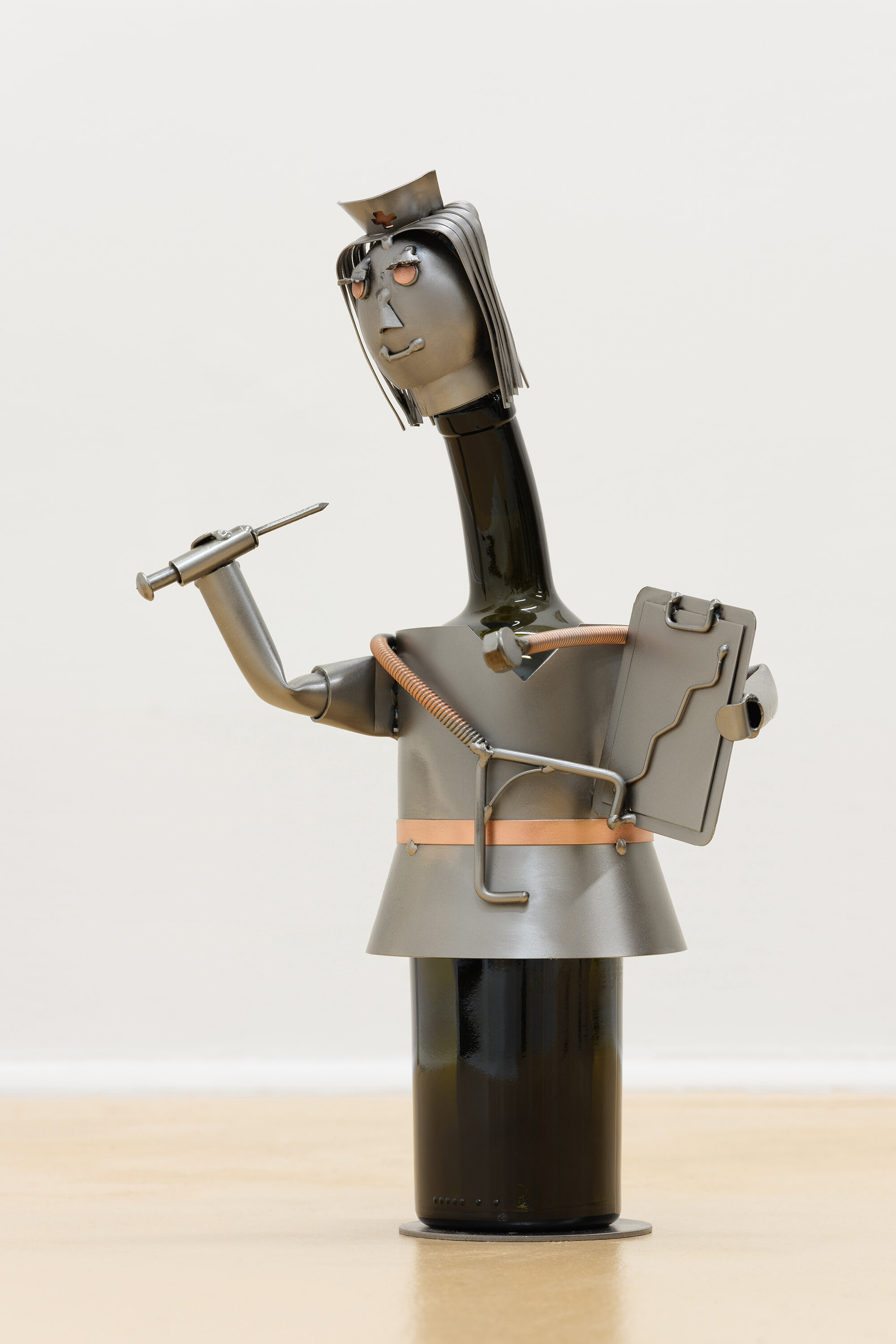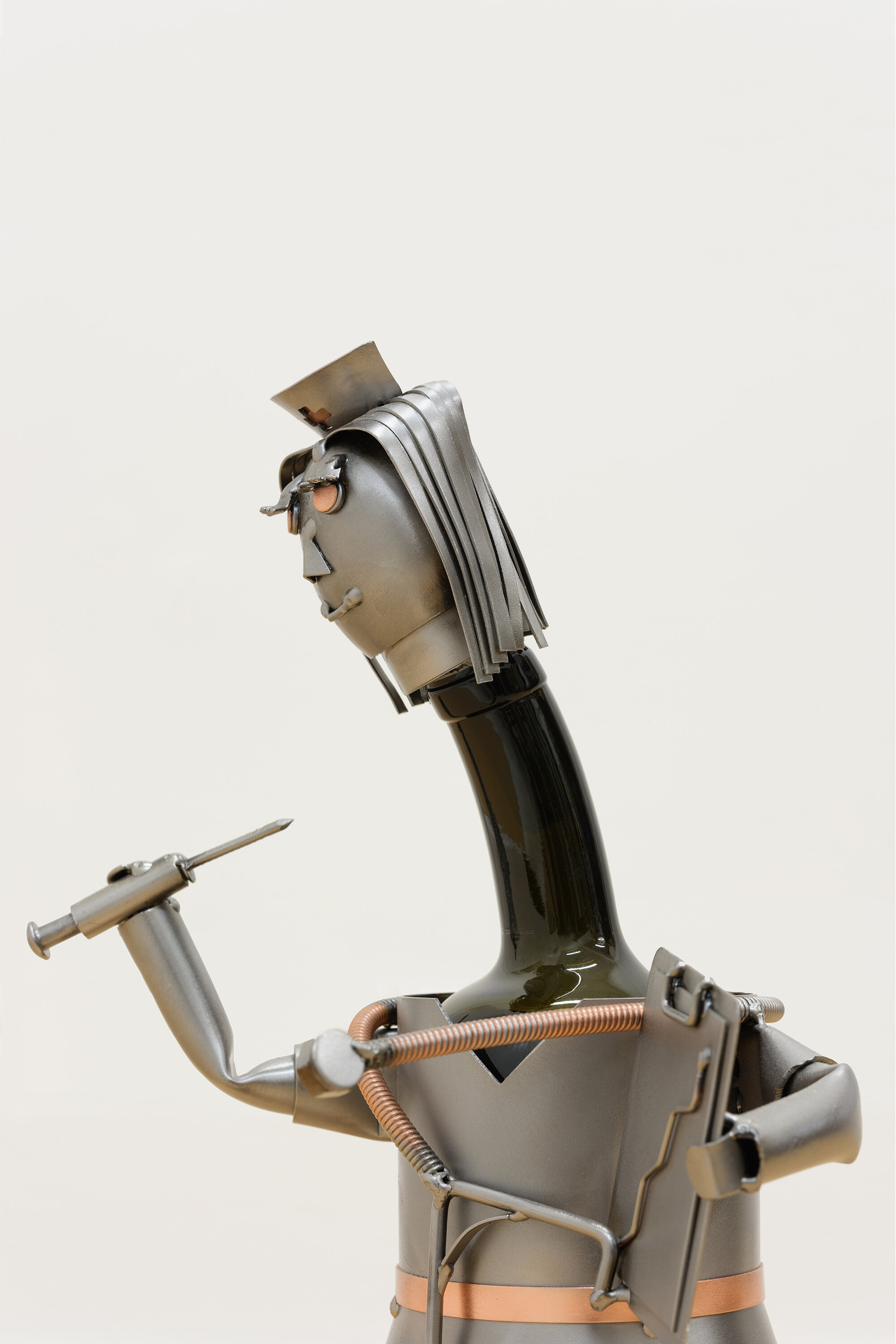Dennis Witkin, Caregiver A
January 16 - February 29, 2020
_info
Et al. presents
Caregiver A
Dennis Witkin
January 16 - February 29, 2020
Opening Reception: Thursday, January 16, 6:00 - 9:00 p.m.
Et al., 620 Kearny San Francisco
My show at Et al. is called Caregiver A. The show is two new bodies of work, a series of paintings and three sculptures. The paintings are inspired by a sculpture in my dad's dental office that a client gave him. The sculptures are inspired by something I saw in the gift shop across the street from his dental office, but also Sammy's "Mom." I had a studio visit with my friend Ellis, the work and conversation about the work resulted in this writing by him. His essay + this intro can be thought of as the press release.
-den
Dennis Witkin (b. 1992 New York, NY) lives and works in Queens, NY. He is co-director of Kimberly-Klark.
______________________________
CARETAKER B
‘it is only when the body is comfortable, when it has ceased to be an obsessive object of perception and concern, that consciousness develops other objects, [...] that for any individual the external world comes into being and begins to grow’
Scarry, The Body in Pain
I have been told that LaGuardia Airport will never be out from under construction. I’ve almost missed every flight out of that place. This may be due to poor planning, but I suspect the pervasive confusion surrounding the whole hub could make it difficult to be in the right place at the right time. Which is how you catch a flight. Airports are designed as places of transition, but LaGuardia has more than difficulties in flow. Often a complaint brought up is that LaGuardia is full of trash, but if you really look around anywhere you will see trash is actually everywhere. This essay will become trash when you finish reading it. The words in your head might not, but the paper it’s printed on certainly has to end up somewhere once it stops having a function. Likewise, LaGuardia is referred to as dysfunctional.
Our ability to conceive an object as a working component in a system is how we derive ‘function’. Because the ‘working’ and the ‘systems’ are up for debate, function is contextual. Context varies from person to person, so logically an object might never lose its functionality. But given that if you look anywhere you will find trash everywhere, it seems that we tend to abandon things when they no longer mean anything to us. Not that all human relations are a matter of instrumentality, but that meaning- making is only possible when we find use in particular meanings. But this is the problem: if we only care about the meaning of a thing, and all that remains is stuff, it starts to pile up, and things start to fall apart.
To give care (a word derived from ‘concern’ and worry’) is to focus one’s attention toward an object of concern and try to preserve it. Dennis tells me that ‘care-givers’ care for the living, and ‘care-takers’ for the inanimate. Yet in the context of ‘care’, giving and taking are the same. And things that must be taken care of are often abandoned and neglected, fallen into disrepair. Responsible care-giving is usually called ‘stewardship’, procedural care-giving is called ‘maintenance’. It takes a lot of work to keep something in a functional condition, or at least to stop it from disappearing. It’s hard to tell if the workers in Dennis’s paintings are stewards or maintainers, but maybe that’s part of it.
Time making fools of us all, we might call a project of care-giving Sisyphean. However with LaGuardia there is more at play than just entropic forces. The redevelopment of LaGuardia currently places it as the most significant airport project in the United States in the last 20 years. The newest plan is, essentially, building an entirely new airport over the existing one. A cursory Wikipedia search, which is what I did right before I wrote this sentence, shows us that after being opened in 1939 LaGuardia Airport has been rebuilt and remade continually through multiple overlapping and over-extended projects, all intermingling and entangling with one another. Whether this is part and parcel of engaging with that creation of the massive artifact called ‘New York City’ or if this is indicative of the difficulties in any corporate-municipal partnership at this scale and scope, I cannot say. Is the comfort of human beings and their dwellings the accepted cost of the production of the always changing always growing New York City itself? As a pessimist, I would think yes. Dennis Witkin has told me he is not a pessimist.
What can be said is this: day in and day out workers go to LaGuardia and continue the task of construction, deconstruction, reconstruction. This task that has been called ‘non-functional’ and ‘depressing’. Continuing a task that is ‘non-functional’ could, ignoring the fact that those workers are likely not continuing because they deeply care about specifically fixing LaGuardia, possibly be called ‘meaningless.’ Or at least it is a bit tragic. Capitalism, if you believe in that sort of thing, is likely to blame.
Much like care, work’s product is often thought of as work’s intention. Work is an intentional task and the object it produces is the artifact of that intention. The exchange for labor bears fruits and those fruits give meaning to that labor. So if the intended end product is a completed and functional LaGuardia Airport ... what is this seemingly endless work? If the process of (re)construction currently defines an ability to conceptualize LaGuardia itself, how does the maintenance needed to prevent the airport from falling into further disrepair figure within work’s logic of exchange when the main product of the work itself is simply more terminals, a new eastern concourse, bridges, infrastructure — et al in need of care?
If one perceives ‘care-giving’ as the intention and ‘functionality’ as the product, but this product never arrives (or is withheld) then the logic of exchange that excuses the process of work collapses under the weight of neglect — keeping the future at bay by extending the miserable present. Misery is the deferral of one’s agency, and so I do not believe this misery is unique to LaGuardia Airport. In the face of neglect and mismanagement, care-giving is not so much ‘meaningless’, but its continuation begs the question: by what means can we reconcile with so many undelivered promises. In place of the logic of exchange described earlier, the practice of care could be viewed as the very production of care-in-itself. However this is no consolation for what has returned from the past as now- wasted labor.
Laguardia is expressed through many different registers. Financially, it is profitable. It is the third most attended NYC airport. Existentially, it is labor and maintenance: it is care given and care taken.
The three sculptures in this show, a mixture of handmade craft and readymade object, are named after a care-giver that Dennis knows personally. She looks after a tortoise that Dennis met as a child at some mix of petting zoo and an animal jail. The tortoise is named Sammy. Sammy was taken from his natural habitat and neglected for a long time, but now he’s doing much better thanks to her efforts. She feeds him, washes him, cleans him, and administers his medicine. He lives on a nice bit of land in Central Florida where he can wander about and do tortoise things. Dennis skypes with him sometimes. Recently, Sammy broke a young banana tree that she had planted in his enclosure. The tree was beautiful, and Amanda was sad to see it gone, but that Sammy had the energy to do anything so strenuous was a good sign. Even if destructive, a promise for the future.
Ellis von sternberg is an ongoing process in the desanctification of friendship. Other interests include: the philosophy of cruelty, the philosophy of property, anxiety, community, permeation, waste, and of course: The End of Art. Please direct any questions to 6127233486.

























































